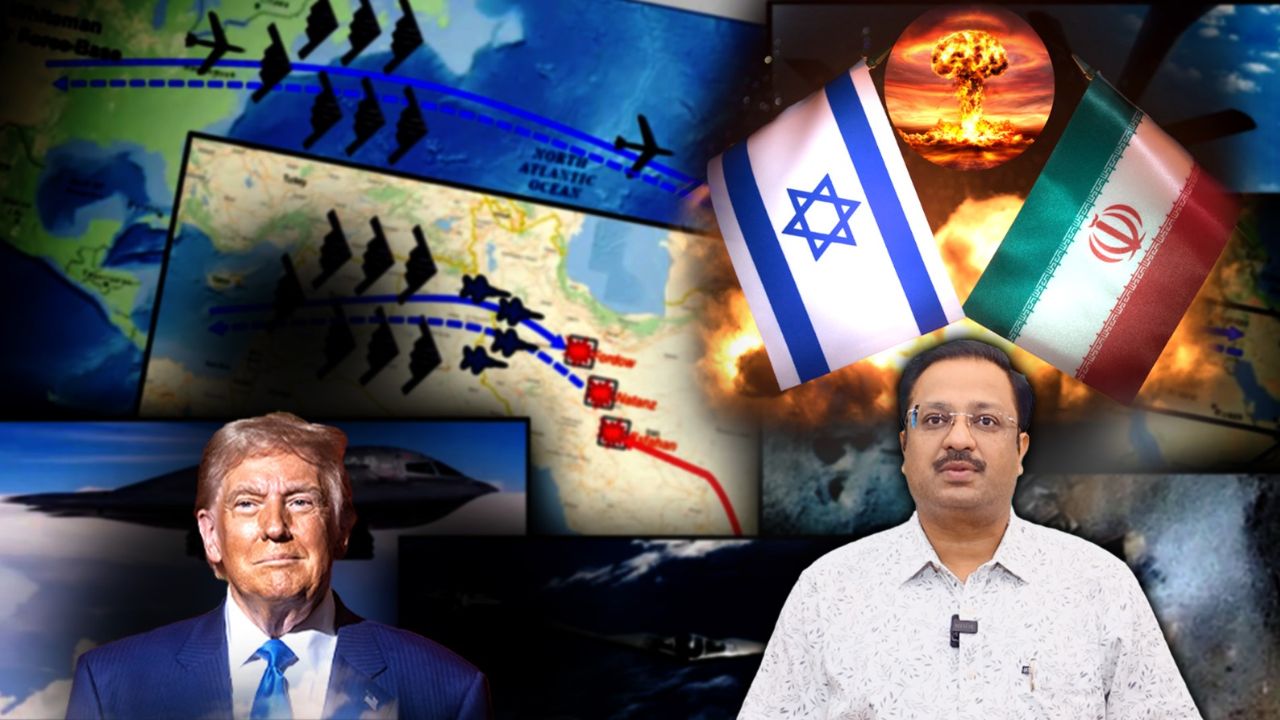 English
English

After America entry in the Israel-Iran war, situation has become more tense than before. Here’s the most accurate analysis by senior journalist Manoj Tibrewal Aakash.

America enters Israel-Iran war
New Delhi: At this time the whole world is facing a global crisis, which is not limited to West Asia, but has engulfed America, Russia, India and the whole world. After 22 years, America has jumped directly into a war for the first time. Due to this, the Israel-Iran war is now at a decisive turn and seems to be moving towards a nuclear confrontation.
Veteran journalist Manoj Tibrewal Aakash on his show 'The MTA Speaks' said that the Israel gave a new height to the war by attacking Iran's missile factory. In response, America launched 'Operation Midnight Hammer' and heavily bombed Iran's three major nuclear bases - Fordo, Natanz and Isfahan. This is the same America that had avoided direct war since the 2003 Iraq war. 7 B-2 stealth bombers participated in this operation and destroyed the nuclear infrastructure by dropping bunker buster bombs.
US President Donald Trump said, "If the current government cannot make the country great, then change is necessary. Make Iran Great Again." He advocated a change of power in Iran, which created a stir in the diplomatic corridors of the whole world. At the same time, Russia openly supported Iran and even said that if needed, warheads would be given to Iran. Former Russian President Medvedev warned that this step of America would backfire and Iran would emerge as more powerful.
Meanwhile, Israel late at night targeted the missile engine factory located in Shahrud, Iran, which is considered the main center of ballistic missile manufacturing. Along with this, air strikes were also carried out on cities like Tehran, Kermanshah and Hamadan, due to which many military plants were destroyed. This attack happened at a time when America has become directly involved in this conflict.
India has successfully evacuated 1713 citizens so far during this crisis. Under 'Operation Sindhu', Indians were safely returned from both Iran and Israel. The Indian Air Force and the Ministry of External Affairs coordinated rapidly in this operation.
Iran also retaliated by firing more than 40 ballistic missiles on Israel, which included advanced missiles like Khyber Shakan. Iran's Foreign Minister Abbas Araghchi reached Russia and met President Putin and talked about strategic cooperation. At the same time, in the United Nations Security Council, Russia accused America of disregarding international opinion and the United Nations Charter.
The oil market was also not untouched by the shock of this war. Crude oil prices rose by up to 3.6% and US stock markets recorded a sharp decline. Dow futures went down by 250 points. The US has advised its citizens to remain alert abroad.
Iran has moved to close the Strait of Hormuz, which is the main route for one-fourth of the world's maritime oil trade. The Iranian Parliament has also passed a resolution for this. The final decision will be taken by the Supreme National Security Council. If this route is closed, energy-dependent countries like India, China and Japan may come into serious trouble.
India has already made strategic preparations. India now buys crude oil from 40 countries and has a strategic oil reserve of 74 days. 50% of LPG comes from domestic production. According to Petroleum Minister Hardeep Singh Puri, India has 500 oil wells and 42 billion barrels of reserve. Options like Qatar, America and Australia are also being worked on rapidly for LNG.
While India is engaged in ensuring energy security under a multi-pronged strategy, the government has given clear indications that it is ready to monitor and intervene at every level to ensure that domestic petrol and diesel prices are not affected. In the last three years, India has cut fuel prices thrice and if needed, exports will be limited and priority will be given to domestic supply.
Pakistan strongly criticized the US attack, saying that it will increase regional violence and Iran has full right to self-defense. Saudi Arabia called this attack a violation of Iran's sovereignty and said that only diplomacy can be resolved.
Egypt and Lebanon have also warned that this attack will lead the entire region to chaos. Iraq called the US action against international law and Qatar said that the current tension could have a global impact.
Oman has called the attack on nuclear bases illegal and talked about radiation and environmental danger, but the worrying thing is that the next phase of this conflict can be even more serious.
Iran has indicated that if Israel and America continue their attacks, it can directly attack American military bases and navy. American military bases in Kuwait, Qatar and Bahrain are on high alert. Israel has advised its citizens to stay in bunkers and a red alert has been issued across the country.
Important parties like the United Nations, European Union and China have appealed for immediate ceasefire and talks. The United Nations has called for a ceasefire.